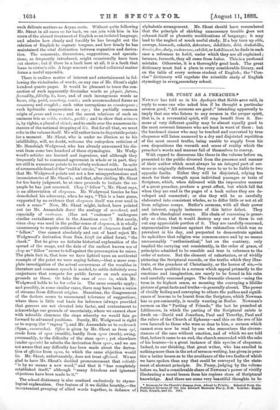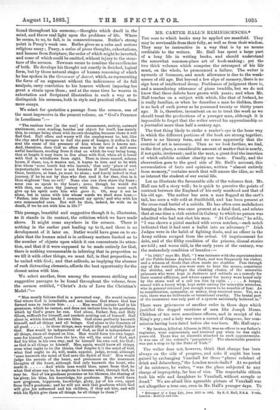DR. PITSEY AS A PREACHER.*
NEwMAN has told us in his Apologia that Keble once said, in reply to some one who asked him if he thought a particular sermon good, "All sermons are good;" intending apparently to imply that one who listens to any sermon in the proper spirit,
that is, in a reverential spirit, will reap benefit from it. Ser- mons of very different quality may be almost equally good to the most reverent listeners who are least in want of them ; but the hardened sinner who may be touched and converted by true eloquence will listen unmoved to a dry and disjointed repetition of the most sacred truths, being unable to supply from his own dispositions the warmth and sense of reality which the preacher's words and manner fail of themselves to convey.
With regard to discourses like those in the volume before us, presented to the public divorced from the presence and manner of their author which must always be an integral part of ser- mons as originally delivered, they seem to us to be liable to two opposite faults. Either they will be disjointed, relying too much for their strength upon individual passages or texts of Scripture, which, when delivered with the impressive manner of a great preacher, produce a great _effect, but which fall flat when they are read in the pages of a book unless they are de- veloped and connected ; or else they will be so carefully elaborated into consistent wholes, as to differ little or not at all from religious essays. Butler's sermons, with all their power and interest, supply instances of this latter defect. They are often theological essays. His chain of reasoning is gener- ally so close, that it would destroy any one of them to cut out any appreciable portion of it. They are carefully-reasoned, argumentative treatises against the rationalism which was so prevalent in his day, and purported to demonstrate against its upholders that religion was common-sense and by no means unreasonably " enthnsiastical," but on the contrary, only implied the carrying out consistently, in the order of grace, of principles admitted to be sensible and true in reference to the order of nature. But the element of exhortation, or of vividly picturing the Scriptural records, or the truths which they illus- trate, or the grandeur of Christianity, or the horror of sin,—in short, those qualities in a sermon which appeal primarily to the emotions and imagination, are rarely to be found in his calm and carefully reasoned pages. The dramatic element —using the term in its highest sense, as meaning the conveying a lifelike picture of great facto and troths—is generally absent. The power of vividly feeling and conveying to others the pathos and signifi- cance of lessons to be learnt from the Scripture, which Newman has so pre-eminently, is mostly wanting in Batter. Newman's sermon on the " Parting of Friends," the last he preached at Littlemore, in which the parting of the Scriptural saints is dwelt on—David and Jonathan, Paul and Timothy, Paul and the rulers of the Church of Ephesus—and this on the eve of his own farewell to those who were so dear to him, a sermon which cannot even now be read by one who remembers the circum- stances of the case without emotion, and of which we are told that, before it came to an end, the church resounded with the sobs of his hearers—is a great instance of this species of eloquence. Indeed, to our thinking, that great writer, who has excelled in nothing more than in the art of sermon-writing, has given in prac- tice a better lesson as to the avoidance of the two faults of which we have spoken than any that could be conveyed by the state- ment of abstract principle. Dr. Pusey, judging by the volume before us, had a considerable share of Newman's power of vividly illustrating a moral lesson from his copious store of Scriptural knowledge. And there are some very beautiful thoughts to be
• Sermons for the Church's Simons from Adontt to Trinity. Selected from the Published Sermons of the late Edward Samaria Pas2y, D.D. Lonlon: Kagan Paul, Trench, and Co. 1883.
found throughout his sermons,—thoughts which dwell in the mind, and throw real light upon the problems of life. Where he seems, to us, to fail, is in consecutiveness. Butler's strong point is Pusey's weak one. Butler gives us a calm and serious religions essay; Posey, a series of pious thoughts, exhortations, and lessons from Scripture, the order of which might be inverted, and some of which could be omitted, without injury to the struc- ture of the sermon. Newman seems to combine the excellencies of both. He develops his thought not exactly in finished, logical form, but by those natural stages of human reasoning of which he has spoken in the Grammar of Assent, which, as representing the force of an argument without the tediousness of its full analysis, carry conviction to his hearers without imposing too great a strain upon them ; and at the same time he weaves in exhortation and Scriptural illustration in such a way as to distinguish his sermons, both in style and practical effect, from mere essays.
We select for quotation a passage from the sermon, one of the most impressive in the present volume, on " God's Presence in Loneliness ":—
4IThe restless love [in the soul] of amusement, society, outward excitement, even reading, besides any object for itself, has mainly this, to escape being alone with its own thoughts, because there it will find God. Dell often and weary will the employment be, but, like the clay used by savages to dull the pain of hunger, it stifles in the soul the sense of the presence of him whose love it knows not. And, therefore, does God so often create in the soul a still more awful loneliness, rending from it that on which its very being hung, that at length it may learn to live alone with God, when all it loved with God is withdrawn from sight. Then in those sacred, solemn hours, if these, too, it wastes not, it learns to love and to be with Nat whom none loseth but who leaveth,' that only place of rest imperturbable where love is not forsaken if itself forsaketh not.' Once, brethren, at least, ye must be alone; and lonely indeed is that journey, if he be not by thee who first trod it for thee, that in it thou mightest fear no evil.' None else can then share thy fears ; none can so speak to thy heart ; none, though ho would die with thee, can share thy journey with thee. Alone must each give up his spirit unto him who gave it. Oh, may it not be alone, but in union with him whose words we shall soon hear,— 'Father, into thine hands I commend my spirit,' and who with his own commended ours. Bat will he then, indeed, be with us in death, if we be not with him in life ?"
This passage, beautiful and suggestive though it is, illustrates, as it stands in its context, the criticism which we have made above. It might come anywhere in the sermon. There is nothing in the earlier part leading up to it, and there is no development of it later on. Butler would have gone on to ex- plain that the human mind is in ordinary matters limited as to the number of objects upon which it can concentrate its atten- tion, and that if it were supposed to be made entirely for God, there is nothing unreasonable in inferring that in proportion as we fill it with other things, we must fail, in that proportion, to be united with God; and that solitude, as implying the absence of such distracting elements, affords the best opportunity for the closest union with him.
We select another, from among the numerous striking and suggestive passages to be found throughout the volume, from the sermon entitled, " Christ's Acts of Love the Christian's Model
4, Man mostly follows God in a perverted way. He would imitate God where God is inimitable, and not imitate God where God has
formed man to imitate him Man would imitate God in his greatness, which he cannot, and does not imitate him in his goodness, which by God's grace he can. God alone, Father, Son, and Holy Ghost, snfficeth for himself, and needeth nothing out of himself. God alone is, within himself, his own bliss. God alone perfectly knoweth himself, and all things and all beings. God alone is the fountain of all good In these things, man would idly and sinfully follow God. Man would be independent of God, as God is independent of all things, since all depend on him. Man would form his own happi- ness for himself, apart from the law, the will, the mind of God, and find his bliss in his own way, and be himself his own end, his God ; as God is all things to himself. Man, again, would know all things, even what ought to be (he thinks, God forgive it!) the mind of God, what God ought to do, will, make, appoint, judge, reveal, although 'none knoweth the mind of God save the Spirit of God.' Man would judge the secrets of the heart, and pronounce on the innermost thoughts of the heart, although God only knoweth the heart, who
made it And while man would thus, apart from God, be what God alone can be, he neglects to become what, through God, be may be. God of his goodness promises us his likeness, the sharing of his glory, his bliss, his knowledge, his goodness. Man would have now greitneas, happiness, knowledge, glory, joy of his own, apart from God's goodness; and he will not seek that goodness which God will give his redeemed and his children, if they ask him, and will with his Spirit give them all things, be all things to them !"



































 Previous page
Previous page